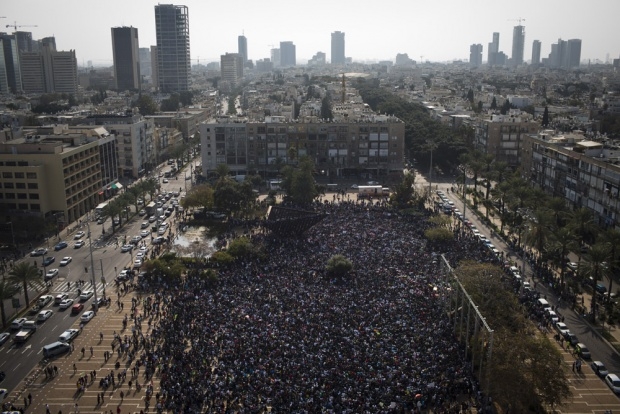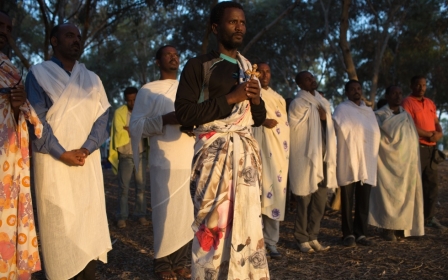Rights groups challenge Israel's detention of African asylum seekers

The Israeli High Court has issued a temporary injunction barring the authorities from issuing new detention orders for African asylum seekers to be held at the Holot detention centre.
The move came after a group of human rights groups submitted an expedited petition demanding that a recent amendment to the country's so-called "anti-infiltration law" be overturned. The legal petition, submitted on Thursday, seeks to invalidate Israel's detention of African asylum seekers, and accused Israeli lawmakers of "continuing to ignore and mock the High Court".
It also demanded that Israel not move African asylum seekers to Shaharonim prison as punishment for infractions that occur at the Holot facility, in the country's southern Negev desert.
"Similarly to the laws that were rejected before it, this law is focused on breaking the spirit, imprisoning and restricting the freedom of those who can not be deported. All this in order to apply pressure on them to leave 'voluntarily' – a goal that the judges described as being an inappropriate purpose and a violation of the principle of non-refoulement," the petitioners wrote in a statement.
In place since 1954, Israel amended the Prevention of Infiltration Law in 2012, allowing for the indefinite detention of asylum seekers that entered the country illegally. A year later, the Israeli High Court ruled that the amendment was unconstitutional and should be revised.
The court stepped in again on 22 September this year to deem a second version of the amendment unconstitutional, and ordered Israel to close the Holot detention facility within 90 days.
Israeli lawmakers passed the latest amendment to the law on 15 December, the same day that parliament, the Knesset, shut down ahead of early general elections.
"If we don't approve this law, the Holot detention centre will close down, and 3,000 infiltrators will go back to South Tel Aviv," said MK Miri Regev, a proponent of the legislation, referring to an area where many asylum seekers live.
The newest version of the law would see asylum seekers held for three months in a closed prison, and then transferred to the 'open' facility for an additional 20 months. Stiffer penalties will also be applied to Israeli employers who have hired asylum seekers.
Israel is home to approximately 50,000 African asylum seekers, most of whom are from Sudan and Eritrea.
While it signed onto the 1951 United Nations Refugee Convention, Israel has never formulated a clear policy to determine refugee status, and doesn't officially process refugee claims. Since its creation in 1948, Israel has recognised fewer than 200 people as refugees.
"The population that this legal appeal refers to is one of the most reviled and vulnerable groups in Israel. The incitement against them has reached unprecedented levels," the rights group said.
"After years of inciting against this group – it is no wonder that lawmakers believe that it is legitimate to adopt new measures to punish, deter, imprison and make miserable the lives of these people."
New MEE newsletter: Jerusalem Dispatch
Sign up to get the latest insights and analysis on Israel-Palestine, alongside Turkey Unpacked and other MEE newsletters
Middle East Eye delivers independent and unrivalled coverage and analysis of the Middle East, North Africa and beyond. To learn more about republishing this content and the associated fees, please fill out this form. More about MEE can be found here.




